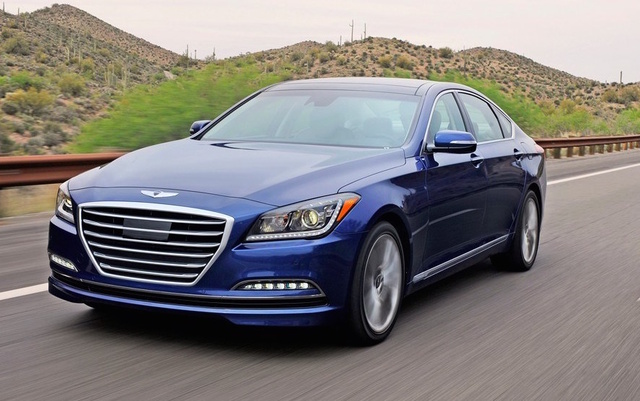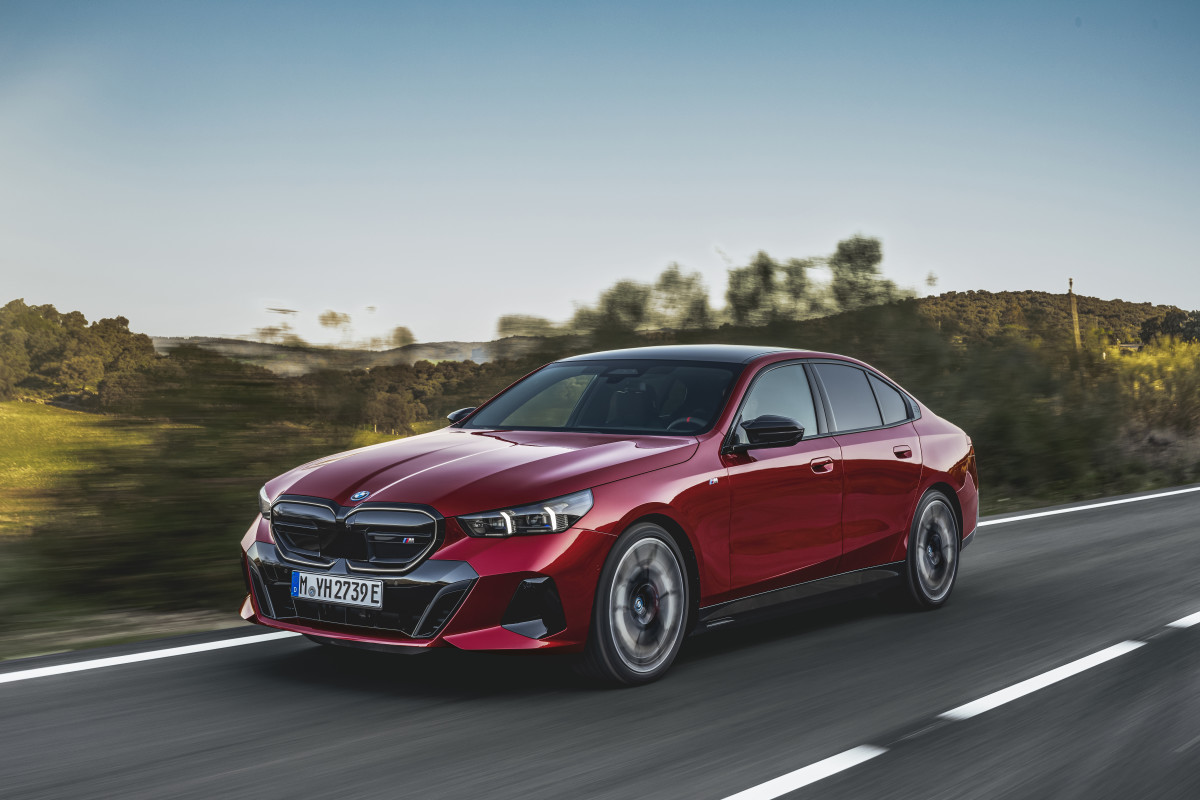BMW 5 Series vs Hyundai Genesis
Overview | |
Years produced2009-2016 | Years produced1972-Present |
MSRP$38,000 | MSRP$59,900 |
Listings449 | Listings9436 |
Ratings & Reviews | |
User Reviews | User Reviews |
Expert reviews8.5 out of 10 | Expert reviews8.0 out of 10 |
Pros
Cons
| |
Reviews SummaryHave you ever seen a sports or action movie in which the protagonist makes a first attempt at a goal early in the movie, fails, then embarks on a training montage, only to succeed in the end? The lesson is that sometimes the first attempt isn’t the best, but if the desire is there, it will eventually lead to victory—but only after addressing one’s shortcomings. That is the 2015 Hyundai Genesis. In 2007, Hyundai brought a concept for the Genesis to the New York International Auto Show and stunned onlookers, not for the car’s design (though it was attractive), but because of the car’s stated goal: Hyundai was getting into the luxury game. The Korean bargain brand? Building a luxury car? The automaker was building highly competent products, but it still came as a shock. Fast-forward to 2014, and the shock has worn off. The Genesis was joined by the Equus, an even higher-end product. But in this time, the Genesis started to feel dated compared to its more aggressively styled siblings. By 2014 the Genesis was feeling almost anonymous. And that all changed for the 2015 model year. | |
Reviews SummaryThe BMW 5 Series is one of three cars that prove the country known for Autobahns, the Nürburgring, and Oktoberfest builds the best luxury sedans on the planet. It competes with the Audi A6 and Mercedes-Benz E-Class, each taking a distinct approach to design but measuring up closely in other parameters. The 2026 5 Series is virtually unchanged, entering its third year following a 2024 redesign, and this review is about the 540i xDrive model. Verdict: Putting BMW’s love-it-or-hate-it design aside, the 2026 540i xDrive is a sensational automobile offering the right blend of luxury, technology, and performance. Choose the M Sport setup for maximum driving enjoyment, or stick with the standard specification to emphasize luxury. Either way, the styling is the most controversial thing about the 5 Series. | |
No video found | No video found |
Popular Features & Specs | |
Engine3.8L 311 hp V6 | Engine2.0L 255 hp I4 |
Drive TrainRWD | Drive TrainRWD |
Seating Capacity5 | Seating Capacity5 |
Horsepower311 hp @ 6000 rpm | Horsepower255 hp @ 4700 rpm |
MPG City18 | MPG City28 |
MPG Highway29 | MPG Highway35 |
Engine | |
Engine Name3.8L 311 hp V6 | Engine Name2.0L 255 hp I4 |
Torque293 lb-ft @ 5000 rpm | Torque295 lb-ft @ 1600 rpm |
Horsepower311 hp @ 6000 rpm | Horsepower255 hp @ 4700 rpm |
DrivetrainRWD | DrivetrainRWD |
Fuel Economy | |
MPG City18 | MPG City28 |
MPG Highway29 | MPG Highway35 |
Interior | |
Leather SeatsStandard | Leather Seats |
Seating Capacity5 | Seating Capacity5 |
Key Features | |
Navigation SystemStandard | Navigation SystemStandard |
Sunroof/Moonroof | Sunroof/MoonroofStandard |
Safety | |
Front Crash Overall5 | Front Crash Overall |
Side Crash Overall5 | Side Crash Overall |
Dimensions & Capacity | |
Cargo Space15.3 cu ft | Cargo Space18.4 cu ft |
Curb Weight4138 lbs | Curb Weight4041 lbs |
Height58.3 in | Height59.6 in |
Length196.5 in | Length199.2 in |
Width74.4 in | Width84.9 in |
Wheelbase118.5 in | Wheelbase117.9 in |
Maximum Payload | Maximum Payload977 lbs |
Number of doors4 | Number of doors4 |
Overview | ||
Years produced | 2009-2016 | 1972-Present |
MSRP | $38,000 | $59,900 |
Listings | ||
Ratings & Reviews | ||
User reviews | ||
Expert reviews | 8.5 out of 10Read full review | 8.0 out of 10Read full review |
Pros & cons | Pros
Cons
| |
Summary | Have you ever seen a sports or action movie in which the protagonist makes a first attempt at a goal early in the movie, fails, then embarks on a training montage, only to succeed in the end? The lesson is that sometimes the first attempt isn’t the best, but if the desire is there, it will eventually lead to victory—but only after addressing one’s shortcomings. That is the 2015 Hyundai Genesis. In 2007, Hyundai brought a concept for the Genesis to the New York International Auto Show and stunned onlookers, not for the car’s design (though it was attractive), but because of the car’s stated goal: Hyundai was getting into the luxury game. The Korean bargain brand? Building a luxury car? The automaker was building highly competent products, but it still came as a shock. Fast-forward to 2014, and the shock has worn off. The Genesis was joined by the Equus, an even higher-end product. But in this time, the Genesis started to feel dated compared to its more aggressively styled siblings. By 2014 the Genesis was feeling almost anonymous. And that all changed for the 2015 model year. | The BMW 5 Series is one of three cars that prove the country known for Autobahns, the Nürburgring, and Oktoberfest builds the best luxury sedans on the planet. It competes with the Audi A6 and Mercedes-Benz E-Class, each taking a distinct approach to design but measuring up closely in other parameters. The 2026 5 Series is virtually unchanged, entering its third year following a 2024 redesign, and this review is about the 540i xDrive model. Verdict: Putting BMW’s love-it-or-hate-it design aside, the 2026 540i xDrive is a sensational automobile offering the right blend of luxury, technology, and performance. Choose the M Sport setup for maximum driving enjoyment, or stick with the standard specification to emphasize luxury. Either way, the styling is the most controversial thing about the 5 Series. |
Video | No video found | No video found |
Popular Features & Specs | ||
Engine | 3.8L 311 hp V6 | 2.0L 255 hp I4 |
Drive Train | RWD | RWD |
Seating Capacity | 5 | 5 |
Horsepower | 311 hp @ 6000 rpm | 255 hp @ 4700 rpm |
MPG City | 18 | 28 |
MPG Highway | 29 | 35 |
Engine | ||
Engine Name | 3.8L 311 hp V6 | 2.0L 255 hp I4 |
Torque | 293 lb-ft @ 5000 rpm | 295 lb-ft @ 1600 rpm |
Horsepower | 311 hp @ 6000 rpm | 255 hp @ 4700 rpm |
Drivetrain | RWD | RWD |
Fuel Economy | ||
MPG City | 18 | 28 |
MPG Highway | 29 | 35 |
Interior | ||
Leather Seats | Standard | |
Seating Capacity | 5 | 5 |
Key Features | ||
Navigation System | Standard | Standard |
Sunroof/Moonroof | Standard | |
Safety | ||
Front Crash Overall | 5 | |
Side Crash Overall | 5 | |
Dimensions & Capacity | ||
Cargo Space | 15.3 cu ft | 18.4 cu ft |
Curb Weight | 4138 lbs | 4041 lbs |
Height | 58.3 in | 59.6 in |
Length | 196.5 in | 199.2 in |
Width | 74.4 in | 84.9 in |
Wheelbase | 118.5 in | 117.9 in |
Maximum Payload | 977 lbs | |
Number of doors | 4 | 4 |

By: CarGurus + AI
At CarGurus, our team of experienced automotive writers remain at the heart of our content operation, conducting hands-on car tests and writing insightful guides that are backed by years of industry experience. To complement this, we are harnessing AI to make our content offering more diverse and more helpful to shoppers than ever. To achieve this, our AI systems are based exclusively on CarGurus content, ratings and data, so that what we produce is both unique to CarGurus, and uniquely helpful to car shoppers.








































